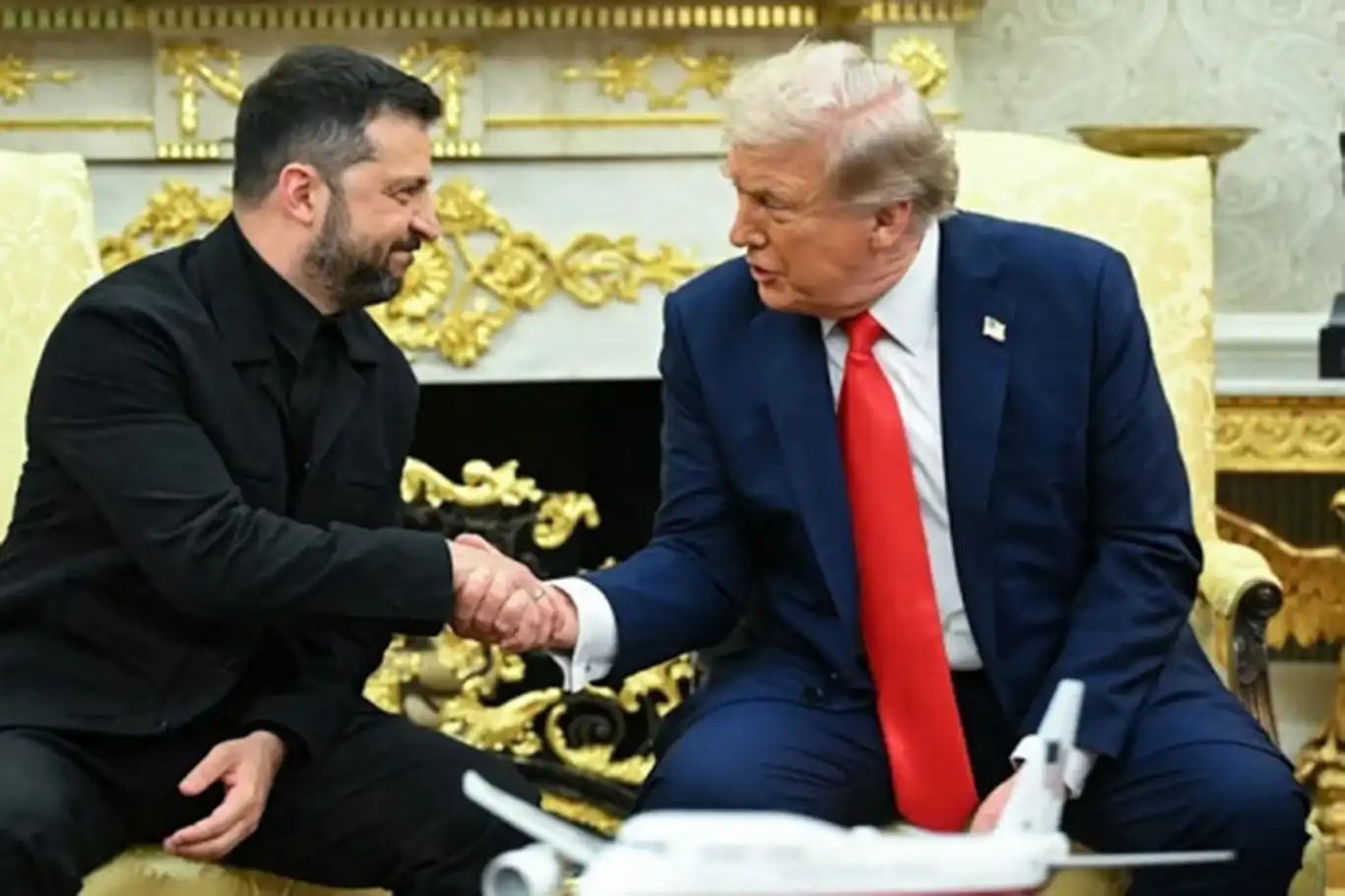Ukraine seeks $100 billion U.S. weapons deal to secure post-war guarantees


Ukraine has unveiled an ambitious proposal to purchase $100 billion worth of American weapons, financed largely by European allies, in a bid to secure long-term U.S. security guarantees after a potential peace deal with Russia.
The plan, first reported by the Financial Times, was circulated among Kyiv’s European partners ahead of President Volodymyr Zelenskyy’s high-stakes meeting with U.S. President Donald Trump at the White House on Monday.
The proposal also includes a $50 billion partnership with U.S. defense firms to jointly produce drones, highlighting Ukraine’s strategy of tying its security future to American defense industries. Kyiv hopes that by framing the deal as a massive boost to U.S. manufacturing, it will align with Trump’s transactional approach to foreign policy.
“We’re not giving anything. We’re selling weapons,” Trump told reporters after the meeting, stressing that the plan represents economic gains for the U.S. rather than aid.
Details of the Proposal
According to Ukrainian officials, the deal envisions acquiring at least 10 Patriot air defense systems, as well as long-range missiles and other critical defense equipment. While the specific weapons list remains classified, Kyiv emphasized that its objective is to create a deterrence framework robust enough to prevent future Russian offensives.
The document also made clear that Ukraine rejects any territorial concessions to Russia. It specifically rebuffed Russian President Vladimir Putin’s suggestion to freeze the frontlines in exchange for Ukrainian troop withdrawals from Donetsk and Luhansk. Kyiv argued that such concessions could allow Russia to regroup and potentially advance toward the strategic city of Dnipro.
Instead, Zelenskyy’s government is pushing for a ceasefire first, followed by a comprehensive peace agreement anchored in strong Western-backed guarantees.
Europe’s Role
German Chancellor Friedrich Merz, who joined the Washington talks, underscored the urgency of halting hostilities: “I can’t imagine that the next meeting would take place without a ceasefire,” Merz said, urging coordinated Western pressure on Moscow to agree to negotiations.
French President Emmanuel Macron supported Ukraine’s stance, warning against any deal that might restrict the size or capacity of Ukraine’s military. He called instead for a “robust Ukrainian army” capable of resisting future aggression.
At the same time, European leaders signaled readiness to shoulder part of the financial burden of Ukraine’s arms purchases, acknowledging that the proposal could reshape Europe’s security architecture.
Reparations and Sanctions
Kyiv’s proposal further demands that Russia pay reparations for wartime destruction, potentially through the seizure of $300 billion in frozen Russian assets held in Western banks. It also insists that sanctions relief for Moscow be made conditional on full compliance with any eventual peace deal.
Ukrainian officials cited recent Russian media mockery of Trump as proof of the Kremlin’s lack of seriousness in peace efforts, raising doubts about Moscow’s willingness to engage constructively.
Ongoing Attacks and Doubts About Trump’s Role
Even as diplomatic talks advanced, Russian forces launched new strikes on Ukrainian cities, including Kharkiv and Zaporizhzhia, killing at least 10 civilians on Monday. The attacks highlighted the fragility of the situation and the urgency of securing binding guarantees.
Meanwhile, Zelenskyy and his allies remain wary of Trump’s approach. During a recent meeting with Putin in Alaska, the U.S. president reportedly entertained Moscow’s talking points, including possible territorial “exchanges” — sparking concern in Kyiv’s parliament over his true intentions.
Some Ukrainian lawmakers compared vague Western proposals, such as those floated by Italian Prime Minister Giorgia Meloni, to the 1994 Budapest Memorandum, which failed to prevent Russia’s annexation of Crimea in 2014.
NATO and EU Assurances
Despite Kyiv’s unease, Western institutions have expressed strong support. European Commission President Ursula von der Leyen pledged to develop “strong security guarantees” for Ukraine, while NATO Secretary General Mark Rutte confirmed that territorial concessions were not part of the White House talks.
What Comes Next
According to U.S. and Kremlin sources, Trump is preparing to host a possible Zelenskyy-Putin bilateral meeting, followed by a trilateral summit, within the next two weeks. The location and agenda, however, remain undecided.
Zelenskyy voiced cautious optimism after the Washington talks, suggesting that the framework for Ukraine’s security guarantees could be finalized within 10 days. Still, he acknowledged that “unpacking the details” of the commitments remains a complex task.
For Ukraine, the stakes are clear: securing a lasting peace that safeguards sovereignty while leveraging economic incentives to bind U.S. support in a rapidly shifting geopolitical landscape. (ILKHA)
LEGAL WARNING: All rights of the published news, photos and videos are reserved by İlke Haber Ajansı Basın Yayın San. Trade A.Ş. Under no circumstances can all or part of the news, photos and videos be used without a written contract or subscription.
Brigadier General Abolfazl Shekarchi, senior spokesperson for Iran’s Armed Forces General Staff, reaffirmed Iran’s unwavering support for the Palestinian cause and underlined the independence of resistance movements across the region.
United Nations spokesperson Stéphane Dujarric has called for urgent, large-scale humanitarian access to the Gaza Strip, warning that the lives of millions are at risk due to severe starvation and ongoing Israeli military operations.
Government offices and banks across parts of Iran were closed on Wednesday as the country battled a scorching heatwave, with temperatures soaring above 40 degrees Celsius (104 F) and straining the nation’s electricity grid.